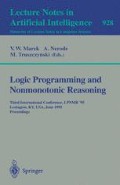Abstract
In this paper, we argue that logic programming semantics can be more meaningful for abductive reasoning than classical inference by providing examples from the area of knowledge representation and reasoning. The main part of the paper addresses the issue of the computational complexity of the principal decisional problems in abductive reasoning, which are: Given an instance of an abduction problem (i) does the problem have solution (i.e., an explanation); (ii) does a given hypothesis belong to some explanation; and (iii) does a given hypothesis belong to all explanations. These problems are investigated here for the stable model semantics of normal logic programs.
This author was partially supported by the Italian National Research Council under grant 224.07.4/24.07.12; the main part of his work has been carried out while he was visiting the Christian Doppler Lab for Expert System.
Preview
Unable to display preview. Download preview PDF.
References
K. Apt, H. Blair, and A. Walker. Towards a Theory of Declarative Knowledge. In J. Minker, editor, Foundations of Deductive Databases and Logic Programming, pages 89–148. Morgan Kaufman, Washington DC, 1988.
C. Baral and M. Gelfond. Logic Programming and Knowledge Representation Journal of Logic Programming, 19–20:72–144, 1994.
N. Bidoit and C. Froidevaux. General Logic Databases and Programs: Default Semantics and Stratification. Information and Computation, 19:15–54, 1991.
L. Console, D. Theseider Dupré, and P. Torasso. On the Relationship Between Abduction and Deduction. Journal of Logic and Computation, 1(5):661–690, 1991.
M. Denecker and D. De Schreye. SLDNFA: an abductive procedure for normal abductive logic programs. In Proc. JICSLP-92, pp. 686–700, 1992.
M. Denecker and D. De Schreye. Representing incomplete knowledge in abductive logic programming. In Proc. ILPS-93, pp. 147–163, 1993.
P. Dung. Negation as Hypotheses: An Abductive Foundation for Logic Programming. In Proc. ICLP-91. MIT Press, 1991.
T. Eiter and G. Gottlob. The Complexity of Logic-Based Abduction. JACM, 1995. Extended abstract Proc. STACS-93, LNCS 665, 70–79.
T. Eiter, G. Gottlob and N. Leone. Abduction from Logic Programs: Semantics and Complexity. TR 94-72 Christian Doppler Lab for Expert Systems, 1994.
K. Eshghi and R. Kowalski. Abduction Compared with Negation as Failure. In Proc. ICLP-89, pp. 234–254. MIT Press, 1989.
K. Eshghi. A Tractable Class of Abduction Problems. In Proc. IJCA1-93, pp. 3–8.
M. Gelfond and V. Lifschitz. The Stable Model Semantics for Logic Programming. In Proc. Fifth Conference and Symposium on Logic Programming, B. Kowalski and R. Bowen (eds), pp. 1070–1080, Cambridge Mass., 1988. MIT Press.
K. Inoue. Extended logic programs with default assumptions. In Proc. ICLP-91, pp. 490–504.
K. Inoue. Studies on Abductive and Nonmonotonic Reasoning. PhD thesis, Kyoto University, 1992.
N. Iwayama and K. Satoh. Computing abduction using the TMS. In Proc. ICLP-91, pp. 505–518, 1991.
J. Josephson, B. Chandrasekaran, J. J. W. Smith, and M. Tanner. A Mechanism for Forming Composite Explanatory Hypotheses. IEEE TSMC17:445–454, 1987.
A. Kakas and R. Kowalski and F. Toni. Abductive logic programming. Journal of Logic and Computation, 2(6):719–771, 1992.
A. Kakas and P. Mancarella. Generalized Stable Models: a Semantics for Abduction. In Proc. ECAI-90, pp. 385–391, 1990.
A. Kakas and P. Mancarella. Stable theories for logic programs. In Proc. ISLP-91, pp. 88–100, 1991.
K. Konolige. Abduction versus closure in causal theories. Artificial Intelligence, 53:255–272, 1992.
J. Lloyd. Foundations of Logic Programming. Springer, Berlin, 1984.
J. Lobo, J. Minker, and A. Rajasekar. Foundations of Disjunctive Logic Programming. MIT Press, 1992.
W. Marek and M. Truszczyński. Autoepistemic Logic. JACM, 38:588–619, 1991.
W. Marek and M. Truszczyński. Computing Intersection of Autoepistemic Expansions. In A. Nerode, W. Marek, and V. Subrahmanian, editors, Proc. LPNMR-91, pp. 37–50, Washington DC, July 1991. MIT Press.
J. Minker. On Indefinite Data Bases and the Closed World Assumption. In Proc. of the 6th Conference on Automated Deduction (CADE-82), pp. 292–308, 1982.
C. H. Papadimitriou. Computational Complexity. Addison-Wesley, 1994.
Y. Peng and J. Reggia. Abductive Inference Models for Diagnostic Problem Solving. Springer, 1990.
T. Przymusinski. Stable Semantics for Disjunctive Programs. New Generation Computing, 9:401–424, 1991.
D. Saccà. The Expressive Power of Stable Models for DATALOG Queries with Negation. H. Blair, W. Marek, A. Nerode, and J. Remmel (eds), Proc. of the Second Workshop on Structural Complexity and Recursion-Theoretic Methods in Logic Programming, pp. 150–162. Cornell University, Math. Sciences Institute, 1993.
J. Schlipf. The Expressive Powers of Logic Programming Semantics. Proc. ACM PODS-90, pp. 196–204. Extended version to appear in JCSS.
C. Sakama and K. Inoue. On the Equivalence between Disjunctive and Abductive Logic Programs. In Proc. ICLP-94, pp. 88–100, 1994.
B. Selman and H. J. Levesque. Abductive and Default Reasoning: A Computational Core. In Proc. AAAI-90, pp. 343–348, July 1990.
A. Van Gelder, K. Ross, and J. Schlipf. The well-founded semantics for general logic programs. Journal of ACM, 38(3):620–650, 1991.
Author information
Authors and Affiliations
Editor information
Rights and permissions
Copyright information
© 1995 Springer-Verlag Berlin Heidelberg
About this paper
Cite this paper
Eiter, T., Gottlob, G., Leone, N. (1995). Complexity results for abductive logic programming. In: Marek, V.W., Nerode, A., Truszczyński, M. (eds) Logic Programming and Nonmonotonic Reasoning. LPNMR 1995. Lecture Notes in Computer Science, vol 928. Springer, Berlin, Heidelberg. https://doi.org/10.1007/3-540-59487-6_1
Download citation
DOI: https://doi.org/10.1007/3-540-59487-6_1
Published:
Publisher Name: Springer, Berlin, Heidelberg
Print ISBN: 978-3-540-59487-1
Online ISBN: 978-3-540-49282-5
eBook Packages: Springer Book Archive

